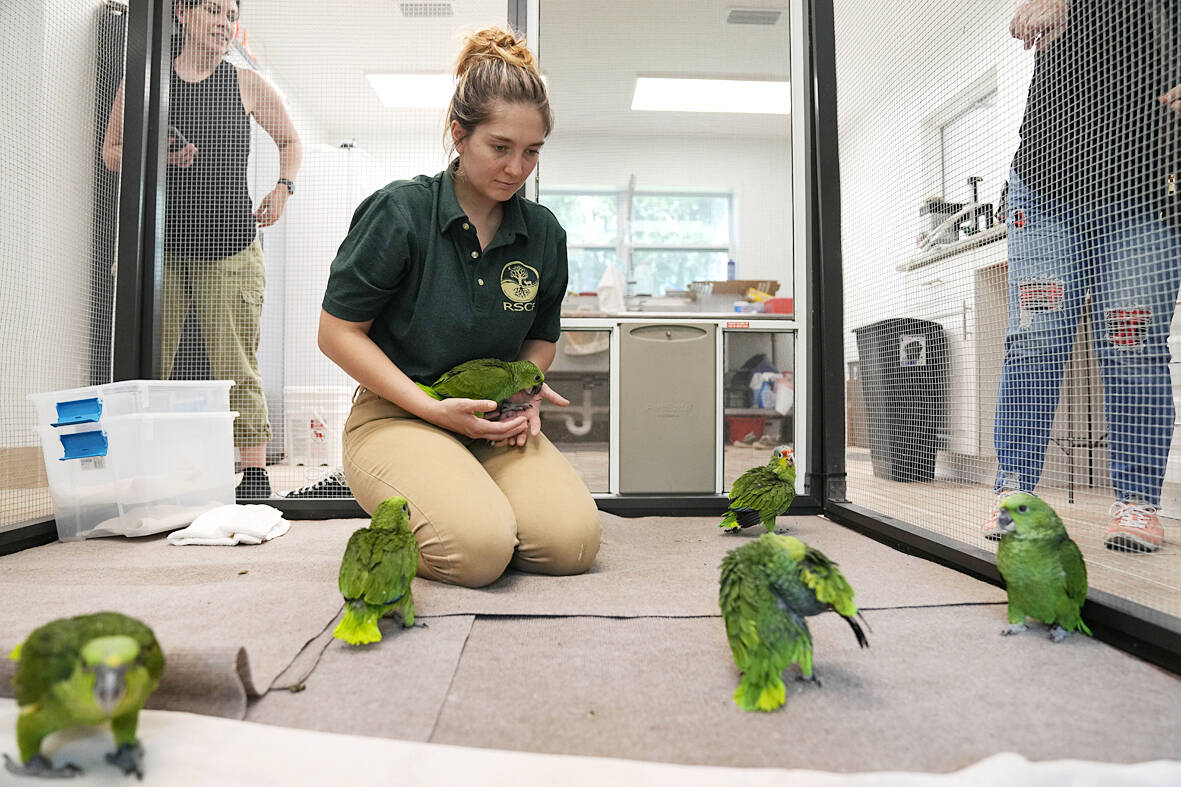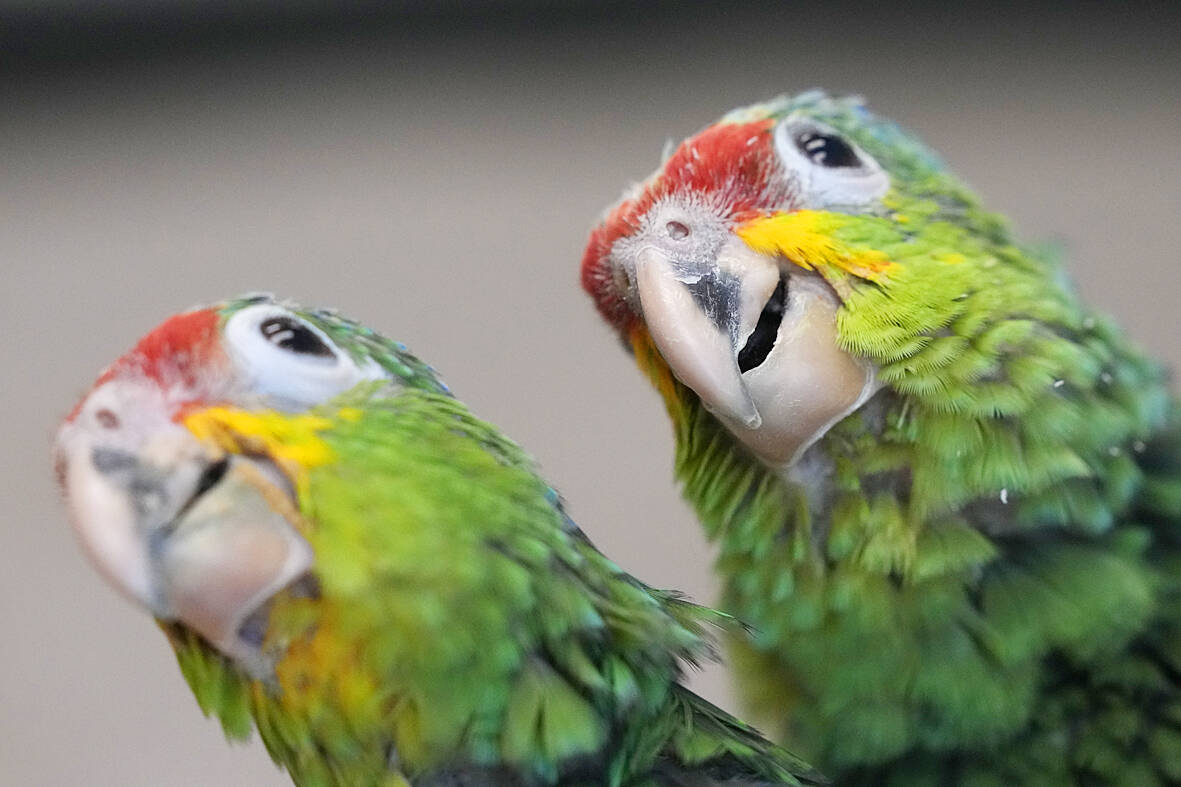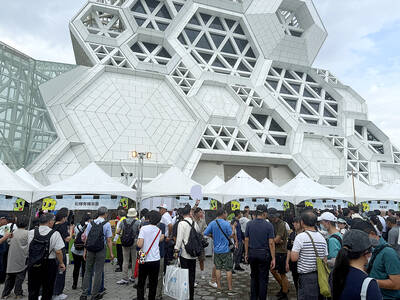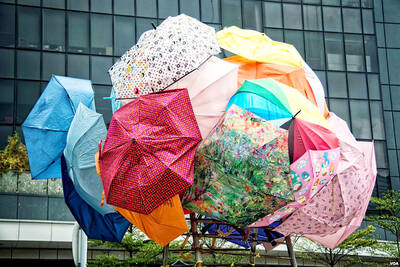The 24 bright green baby parrots began chirping and bobbing their heads the second anyone neared the large cages that have been their homes since hatching in March.
The Central American natives, seized from a smuggler at Miami International Airport, are being raised by the Rare Species Conservatory Foundation — a round-the-clock effort that includes five hand feedings a day in a room filled with large cages.
At just 9 weeks old, these parrots have already survived a harrowing journey after being snatched from their nests in a forest. They are almost fully feathered now and the staff has started transitioning them from a special formula to a diet of food pellets and fruit.

Photo: AP
“You ready to meet the children?” asked Paul Reillo, a Florida International University professor and director of the foundation, as he led visitors Friday into a small building tucked behind a sprawling house in Loxahatchee, a rural community near West Palm Beach.
“They are hand-raised babies,” he said, as the chicks squawked and looked inquisitively at the visitors. “They’ve never seen mom and dad; they’ve been raised by us since they hatched.”
It was the hatchlings’ faint chirping inside a carry-on bag at the Miami airport that brought them to the attention of a US Customs and Border Protection officer. The passenger, Szu Ta-wu, had just arrived on TACA Airlines flight 392 from Managua, Nicaragua, on March 23, and was changing flights in Miami to return home to Taiwan, according to a criminal complaint filed in US District Court in Miami.

Photo: AP
Officers stopped Wu at a checkpoint. He was asked about the sound coming from his bag, which Reillo later described as a “sophisticated” temperature controlled cooler.
Wu reached in and pulled out a smaller bag and showed the officer an egg, the complaint said. The officer then looked inside and saw more eggs and a tiny featherless bird that had just hatched.
He told the officer there were 29 eggs, and that he did not have documentation to transport the birds, according to the complaint.
Wu was arrested, and on May 5 pleaded guilty to charges of smuggling birds into the US. He faces up to 20 years in prison when he’s sentenced Aug. 1.
A lawyer who could speak on his behalf was not listed on court records, but Wu told investigators through a Mandarin interpreter that a friend had paid him to travel from Taiwan to Nicaragua to pick up the eggs. He denied knowing what kind of birds they were.
The officer took the bag and contacted the US Fish and Wildlife Service. By then, eight of the birds had already hatched or were in the process of hatching.
It didn’t take long for federal officials to reach out to Reillo.
“They didn’t know what these things were and wanted my advice on it,” Reillo said. Baby parrots are featherless, so it’s difficult to property identify them.
He helped set up a makeshift incubator in the US. Department of Agriculture’s aviary at the airport in a mad dash to save the now-hatching parrots.
The next day, Stacy McFarlane, a USDA veterinarian who initially tended to the birds and eggs at the airport, and other officials, delivered the baby parrots and remaining eggs to Reillo’s conservatory.
“At that point we were off to the races,” he said. “We’ve got all these eggs, the chicks are hatching, the incubator’s running and by the time it was all said and done, we hatched 26 of the 29 eggs, and 24 of the 26 chicks survived.”
USDA regulations required the birds to be quarantined for 45 days, meaning that Reillo and his team had to scrub down when entering and leaving the room.
But they still weren’t sure which of the 360 varieties of parrots they were dealing with.
A forensics team at Florida International extracted DNA samples from the eggshells and the deceased birds to identify the species. They discovered the 24 surviving parrots were from eight or nine clutches and included two species — the yellow naped Amazon and the red-lored Amazon.
Both birds are popular in the trafficking and caged-bird industries because they are pretty and have a nice temperament, Reillo said.
The trafficking pipeline out of Central America is well established and has gone on for years, he said.
“In fact, the biggest threat to parrots globally is a combination of habitat loss and trafficking,” Reillo said, adding that about 90 percent of eggs are poached for illegal parrot trade.
BirdLife International lists the yellow-naped Amazon as “critically endangered” with a population in the wild of between 1,000 and 2,500. The red-lored Amazon is also listed as having a decreasing population.
“The vast majority of these trafficking cases end in tragedy,” Reillo said. “The fact that the chicks were hatching the first day of his travel from Managua to Miami tells you that it’s extremely unlikely that any of them would have survived had he actually gotten all the way to his destination in Taiwan. That would have been another 24 to 36 hours of travel.”
Reillo is now faced with the challenge of finding a permanent home for the birds, which can live 60 to 70 years, or longer. He said he’s working with the US Fish and Wildlife Services on a plan “to have the birds fly free and help restore their species in the wild.”
“Parrots live a long time. They are sentient creatures. They’re highly intelligent, very social, and these guys deserve a chance,” he said. “The question will be where will they wind up? What is their journey going to be? It’s just beginning.”

Water management is one of the most powerful forces shaping modern Taiwan’s landscapes and politics. Many of Taiwan’s township and county boundaries are defined by watersheds. The current course of the mighty Jhuoshuei River (濁水溪) was largely established by Japanese embankment building during the 1918-1923 period. Taoyuan is dotted with ponds constructed by settlers from China during the Qing period. Countless local civic actions have been driven by opposition to water projects. Last week something like 2,600mm of rain fell on southern Taiwan in seven days, peaking at over 2,800mm in Duona (多納) in Kaohsiung’s Maolin District (茂林), according to

Aug. 11 to Aug. 17 Those who never heard of architect Hsiu Tse-lan (修澤蘭) must have seen her work — on the reverse of the NT$100 bill is the Yangmingshan Zhongshan Hall (陽明山中山樓). Then-president Chiang Kai-shek (蔣介石) reportedly hand-picked her for the job and gave her just 13 months to complete it in time for the centennial of Republic of China founder Sun Yat-sen’s birth on Nov. 12, 1966. Another landmark project is Garden City (花園新城) in New Taipei City’s Sindian District (新店) — Taiwan’s first mountainside planned community, which Hsiu initiated in 1968. She was involved in every stage, from selecting

The latest edition of the Japan-Taiwan Fruit Festival took place in Kaohsiung on July 26 and 27. During the weekend, the dockside in front of the iconic Music Center was full of food stalls, and a stage welcomed performers. After the French-themed festival earlier in the summer, this is another example of Kaohsiung’s efforts to make the city more international. The event was originally initiated by the Japan-Taiwan Exchange Association in 2022. The goal was “to commemorate [the association’s] 50th anniversary and further strengthen the longstanding friendship between Japan and Taiwan,” says Kaohsiung Director-General of International Affairs Chang Yen-ching (張硯卿). “The first two editions

It was Christmas Eve 2024 and 19-year-old Chloe Cheung was lying in bed at home in Leeds when she found out the Chinese authorities had put a bounty on her head. As she scrolled through Instagram looking at festive songs, a stream of messages from old school friends started coming into her phone. Look at the news, they told her. Media outlets across east Asia were reporting that Cheung, who had just finished her A-levels, had been declared a threat to national security by officials in Hong Kong. There was an offer of HK$1m (NT$3.81 million) to anyone who could assist